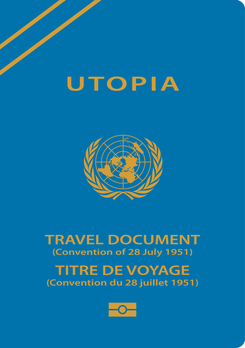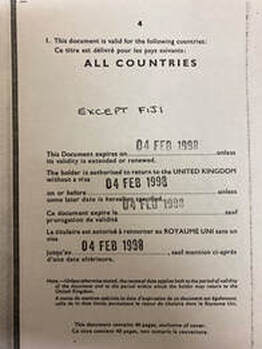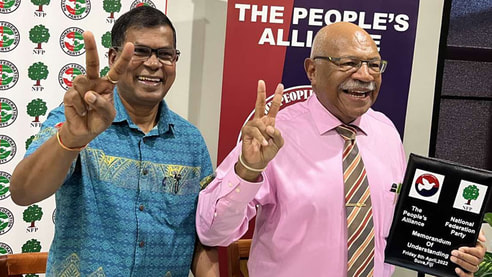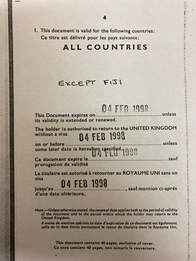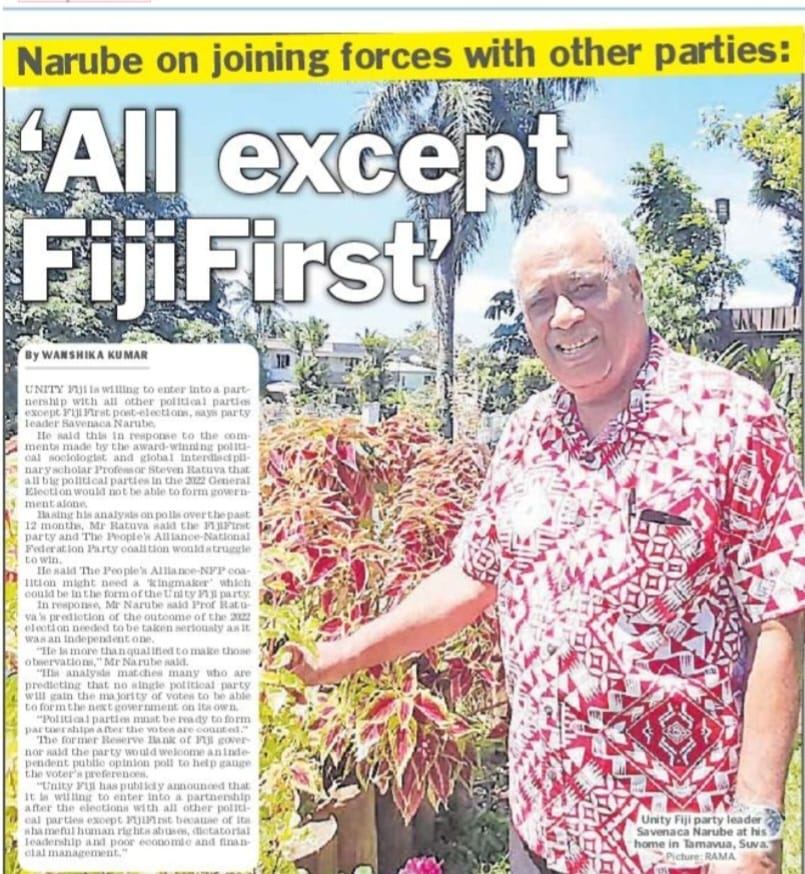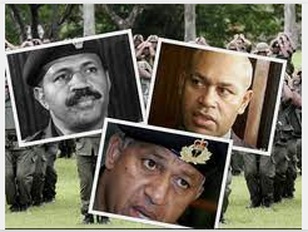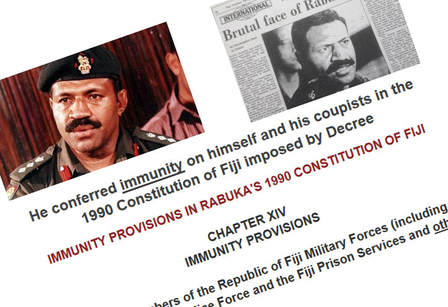Fijileaks: The Fiji Sun opinion poll result is a BOGUS SHAM.
We are repeatedly urged to erase MEMORY and go with the MOMENTUM. And the Momentum, we are told, is with the COUPIST Sitiveni Rabuka and his political wife and Arkarti Biman Prasad, who is refusing to disclose what Cabinet positions he has negotiated for his bridesmaid Lenora Qereqeretabua and Best Man Pio Tikoduadua. We will never allow this ARKARTI to sell our birthright to govern Fiji. This TRAITOR keeps going around Fiji and the world telling us that his political husband Rabuka and his former leader Jai Ram Reddy gave us the 1997 Constitution.
* We have told this Arkarti to SHUT UP. For after the 'Guns of Lautoka' which Reddy and Others were crying for, our Founding Editor-in-Chief remained BANNED from Fiji, locked up in different British detention centres until the courts ruled against extradition. And for over the next decade had to travel on the much-despised United Nations Travel Document issued to stateless persons, starting with the Jews who fled Adolf Hitler.
*After the 'Guns of Lautoka', our Editor-in-Chief's youngest sister was RAPED and MURDERED by RABUKA'S RACIST and RAPIST MOB but our Editor remained banned from Fiji and HER Funeral. And many, many, many other funerals
So this NFP Political Arkarti should SHUT UP. The coward was hiding under the bed at USP and now is talking tough, while his academic colleagues were fighting for Indo-Fijian rights. We say: UP YOURS, TO THE ARKARTI.
The day we open our mouths, supported with documents etc, many Indo-Fijian TRAITORS who betrayed us after 1987 for political gain will have nowhere to hide in Fiji.
We have more respect for the 'BOMBER' than this 'POLITICAL BASTARD' humming the 1997 Constitution under which our Founding Editor-in-Chief remained banned from the country of his birth.
1987: RACIST COUPS. From 1987 to 1999, Indo-Fijians and Other Groups (minus I-Taukei and Rotumans) second class citizens under the 1990 Constitution of Fiji
*Rabuka Liu Muried FLP and its leader Chaudhry after getting their votes to become PM in 1992 (see full article below)
*Why is MAHENDRA CHAUDHRY silent as a church mouse on Rabuka's track record of human rights abuses, dictatorial leadership, and poor economic and financial management?
*The SVT government bankrupted the National Bank of Fiji. The NFP's Political Akarti tells us not to look back on Rabuka and 1987? Well, this man should give back virginity to Indo-Fijian girls who were RAPED by Rabuka's rampaging mob. He had released the RAPISTS from Prison
*Narube needs to have his head examined at St Giles! A clear pattern is beginning to emerge: defeat FFP and return Fiji to the Reservoir POLITICAL DOGS. It's DOG EAT DOG in Fiji.
* We must never hear the Tagi ni i-Taukei CRY ever in Fiji.
* And it was the RACIST RABUKA who introduced it into Fiji.
The Indo-Fijians felt the full brunt from 1987 to 1999
‘There was nothing in the Deed of Cession to say that when England was to hand over Fiji that it was to hand it over holus-bolus to the Fijian people and to the Fijian people alone. There was nothing whatsoever written in it and as the Fijian chiefs gave Fiji unreservedly to Great Britain, my interpretation is that if Great Britain wants to give it back she gives it back in the condition which she finds it. It does not necessarily mean that she should give it back to the Fijian people.’
Ratu William Toganivalu, a high chief and Cabinet Minister in Alliance Government, Fiji's House of Representatives in June 1970
Unity Fiji is willing to enter into a partnership with all other political parties except FijiFirst post-elections, says party leader Savenaca Narube.
He said this in response to the comments made by the award-winning political sociologist and global interdisciplinary scholar Professor Steven Ratuva that all big political parties in the 2022 General Election would not be able to form government alone.
Basing his analysis on polls over the past 12 months, Mr Ratuva said the FijiFirst party and The People’s Alliance-National Federation Party coalition would struggle to win.
He said The People’s Alliance-NFP coalition might need a ‘kingmaker’ which could be in the form of the Unity Fiji party.
In response, Mr Narube said Prof Ratuva’s prediction of the outcome of the 2022 election needed to be taken seriously as it was an independent one.
“He is more than qualified to make those observations,” Mr Narube said.
“His analysis matches many who are predicting that no single political party will gain the majority of votes to be able to form the next government on its own.
“Political parties must be ready to form partnerships after the votes are counted.”
The former Reserve Bank of Fiji governor said the party would welcome an independent public opinion poll to help gauge the voter’s preferences.
“Unity Fiji has publicly announced that it is willing to enter into a partnership after the elections with all other political parties except FijiFirst because of its shameful human rights abuses, dictatorial leadership and poor economic and financial management.”
He said this in response to the comments made by the award-winning political sociologist and global interdisciplinary scholar Professor Steven Ratuva that all big political parties in the 2022 General Election would not be able to form government alone.
Basing his analysis on polls over the past 12 months, Mr Ratuva said the FijiFirst party and The People’s Alliance-National Federation Party coalition would struggle to win.
He said The People’s Alliance-NFP coalition might need a ‘kingmaker’ which could be in the form of the Unity Fiji party.
In response, Mr Narube said Prof Ratuva’s prediction of the outcome of the 2022 election needed to be taken seriously as it was an independent one.
“He is more than qualified to make those observations,” Mr Narube said.
“His analysis matches many who are predicting that no single political party will gain the majority of votes to be able to form the next government on its own.
“Political parties must be ready to form partnerships after the votes are counted.”
The former Reserve Bank of Fiji governor said the party would welcome an independent public opinion poll to help gauge the voter’s preferences.
“Unity Fiji has publicly announced that it is willing to enter into a partnership after the elections with all other political parties except FijiFirst because of its shameful human rights abuses, dictatorial leadership and poor economic and financial management.”
‘Rabuka had already learned the art of political double speak (what we in Fiji call aage pichie or liu muri) and was prepared to walk a precarious path to stay in power’ - Rabuka's official biographer John Sharpham in Rabuka of Fiji
The 1992 Elections: Rabuka fighting and betraying to remain Prime Minister
By VICTOR LAL
Fiji's Daily Post, 2001
The new 1990 Constitution was overtly racist and biased in favour of Fijians. In the new 70 seat Parliament, Fijians were allocated 37 seats, Indo-Fijians 27, General Voters 5 and Rotumans 1. The Senate had 24 seats for Fijians, 9 for other races and 1 for Rotumans. In addition, all the key government posts-the presidency, prime ministership and heads of the judiciary, military, public service-had to be held by Fijians. A quota of at least 50 per cent Fijians was set for new recruitment into the public service.
Another important feature of the distribution of Parliamentary seats was the gerrymandering of the 37 Fijian constituencies because many urban Fijians had voted for Bavadra’s government in the 1987 elections. Thus rural Fijian voters were given 32 constituencies with the remaining 5 going to urban Fijian voters.
With the new racist 1990 Constitution promulgated and Fijian political supremacy guaranteed, the first general election was held in 1992. The principal parties that entered the election contest were: SVT, FLP, NFP, General Voters Party (GVP) and the Fijian Nationalist United Front (FNUF). Meanwhile, the NFP-FLP Coalition had split up following the death of Dr Timoci Bavadra. The FNUF, led by the late Sakiasi Butadroka, was a coalition of extremists from Fijian nationalist party (FNP) and SVT, which was formed in March 1991 with Rabuka as its political leader. The SVT had the backing of the Great Council of Chiefs. The SVT was not necessarily a unified political group and the real issue for the party was who was to become Prime Minister after the election: the ‘Father of the Coups’ Sitiveni Rabuka or the reliable, safe, moderate but right-wing Josevata Kamikamica? .
The political divisions within the Indo-Fijians, who are ‘All Chiefs and No Indians’, was not surprising. As the old coolie saying goes: ‘You put two Indians on a desert island and on your return next day to pick them up, you will find they have become three Indians.’ The FLP, led by Mahendra Chaudhry, initially threatened to boycott the elections, stating that taking part would be tantamount to endorsing the 1990 ‘racist constitution’. However, at the last minute, the FLP leaders changed their stance and contested the election. The result of the 37 Fijian seats were as follows: SVT 30, FNUF 5 and the last 2 went to Independents. The 27 Indo-Fijian seats were equally shared: the NFP won 14 and the FLP the other 13. The GVP won the 5 seats. The election results created the inevitability of a Coalition government.
Although the SVT was theoretically in a position to form a coalition government, Rabuka was not assured of the coveted Prime Ministership. Some newly-elected SVT parliamentarians had thrown in their lot with Rabuka’s arch political rival, Josevata Kamikamica, a former Finance Minister in the pre-election Interim Government.
Rabuka appeared to have 18 votes with Kamikamica only two, Filipe Bole four, and Ratu William Tonganivalu three. However Bole, Rabuka’s former teacher, freed his votes to allow them to support the majority-holder, in this case Rabuka who needed 36 confirmed votes from those who now held seats in the new House to grab the post of Prime Minister. He went to the Government House asking President Ratu Penaia Ganilau to appoint him as Prime Minister, declaring that he had 42 votes. Ganilau asked Rabuka to demonstrate his support with accompanying signatures to confirm the numbers. Ganilau also was acutely aware that that another high-ranking chief, Ratu Mara, and a number of SVT personalities had been backing Kamikamica.
In a cruel twist of irony, both the rival factions of the SVT began to court support from the NFP and FLP, the very parties deposed to ensure Fijian political supremacy in perpetuity. The SVT, formed to unify the Fijian people, could not agree on who should be its parliamentary leader. Rabuka was shocked to learn that Kamikamica had cut a deal with the veteran Indo-Fijian lawyer and politician Jai Ram Reddy and the NFP, and as a result Kamikamica had 30 votes to Rabuka’s 26.
In desperation, the desperately power-hungry Rabuka, who had imprisoned Mahendra Chaudhry twice, and had terrorised him and his family since 1987, shamelessly turned to the FLP leader for his political survival. But first Rabuka had to be humbled and humiliated, and reminded that power flows from the fountain of a ball point pen and not from the barrel of a Fiji Military Forces gun with a sticker reading, ‘God Loves You’. So Chaudhry and the FLP laid down the conditions for their support for Rabuka: a review of the Constitution; repeal of several controversial labour decrees, scrapping of the Value Added Tax (VAT) and land tenure reforms.
The so-called Methodist preacher, a decorated solider, and a cynically pragmatic Fijian nationalist Rabuka, who desperately needed Chaudhry’s 13 historical votes, agreed to sign a letter committing himself to a deal with the FLP. The letter read: ‘I acknowledge the proposed outlined in your letter (2 June) delivered this morning. I have considered your proposals favourably and agree to take action on these issues, namely the constitution, VAT, labour decree reforms and land tenure on the basis suggested in your letter. I agree to hold discussions on the above issue in order to finalise the machinery to progress the matter further.’ In return, he got Chaudhry’s 13 votes to take him well in excess of his required 36 for the post of Prime Minister. The FLP however informed Rabuka that it would not be part of the governing coalition. Desperate to remain Prime Minister, Rabuka had accepted all the conditions in writing, only to dishonour them on resuming power. He had managed to secure the support of the GVP, the Rotuman representative Paul Manueli, his former army commander, and 2 independents.
Now he had the numbers and the prime ministership in his sulu, Rabuka backed away from the agreement with the FLP. A spokesman of his insisted that all Rabuka had agreed to do was to discuss the issues that had been raised. There was, he stated, no agreement to do any more than this. As his official biographer John Sharpham recently put it, ‘Rabuka had already learned the art of political double speak (what we in Fiji call aage pichie or liu muri) and was prepared to walk a precarious path to stay in power’.
King Maker makes ‘Deal with the Devil’
What about Chaudhry who had done a deal with Rabuka and delivered him and a faction of the SVT the prime ministership? When Chaudhry was asked if he had done ‘a deal with the devil?’ he responded: ‘No, there was no deal; the fact is we laid down conditions’. He also acknowledged the irony of the situation between the jailed and the jailor. ‘Oh, yes’, he responded when asked, ‘we hope we can enjoy that type of irony, which does not happen very often’.
Chaudhry clearly relished the role of king-maker where an Indo-Fijian was called upon to arbitrate and settle question of leadership in the chiefly sponsored SVT. It is surprising that the SVT had not run to the Great Council of Chiefs, whom they have recently elevated as the guardians of Fijian political aspirations, to settle the question of political leadership within their own ranks.
Meanwhile Kamikamica continued, in a typical Fijian fashion, to harbour his political ambitions against Rabuka. He refused to enter the post-1992 election Rabuka Cabinet, feeling that he would have been a better Prime Minister. Rabuka’s political woes however continued to shadow him in office, notably the ‘Stephen Affair’. (We will write about the Stephen Affair soon)
Rabuka managed to ward off Chaudhry and his colleagues threatened withdrawal of Labour’s support for him by forming an inter-parliamentary committee to recommend appropriate machinery for considering changes to the 1990 Constitution.
On the Indo-Fijian political front, the rivalry between the NFP and FLP intensified to the benefit of the NFP. In October 1993 the NFP candidates had roundly defeated their FLP Indo-Fijian candidates in the municipal elections. The FLP had also fallen out with Rabuka in 1993 when he did not honour his promises in return for the FLP’s support for the premiership in 1992.
On the Fijian political front, politics essentially still revolved around Rabuka and his political foe, Kamikamica. Rabuka’s critics seized the adverse aspects of the Report into the ‘Stephens Affair’ and called for his resignation. Rabuka brushed aside the resignation calls and even survived a motion of no-confidence in him. However, six Fijian MPs including Kamikamica, and David Pickering from the GVP, finally succeeded in their dogged pursuit to get rid of Rabuka when they voted with the Opposition against his budget 36-33 (with one abstention). The dissidents had hoped that Mara might either appoint Kamikamica or Ratu William Tonganivalu to form a new government.
Instead, Rabuka exercised his constitutional right to dissolve his government and call for new elections.
By VICTOR LAL
Fiji's Daily Post, 2001
The new 1990 Constitution was overtly racist and biased in favour of Fijians. In the new 70 seat Parliament, Fijians were allocated 37 seats, Indo-Fijians 27, General Voters 5 and Rotumans 1. The Senate had 24 seats for Fijians, 9 for other races and 1 for Rotumans. In addition, all the key government posts-the presidency, prime ministership and heads of the judiciary, military, public service-had to be held by Fijians. A quota of at least 50 per cent Fijians was set for new recruitment into the public service.
Another important feature of the distribution of Parliamentary seats was the gerrymandering of the 37 Fijian constituencies because many urban Fijians had voted for Bavadra’s government in the 1987 elections. Thus rural Fijian voters were given 32 constituencies with the remaining 5 going to urban Fijian voters.
With the new racist 1990 Constitution promulgated and Fijian political supremacy guaranteed, the first general election was held in 1992. The principal parties that entered the election contest were: SVT, FLP, NFP, General Voters Party (GVP) and the Fijian Nationalist United Front (FNUF). Meanwhile, the NFP-FLP Coalition had split up following the death of Dr Timoci Bavadra. The FNUF, led by the late Sakiasi Butadroka, was a coalition of extremists from Fijian nationalist party (FNP) and SVT, which was formed in March 1991 with Rabuka as its political leader. The SVT had the backing of the Great Council of Chiefs. The SVT was not necessarily a unified political group and the real issue for the party was who was to become Prime Minister after the election: the ‘Father of the Coups’ Sitiveni Rabuka or the reliable, safe, moderate but right-wing Josevata Kamikamica? .
The political divisions within the Indo-Fijians, who are ‘All Chiefs and No Indians’, was not surprising. As the old coolie saying goes: ‘You put two Indians on a desert island and on your return next day to pick them up, you will find they have become three Indians.’ The FLP, led by Mahendra Chaudhry, initially threatened to boycott the elections, stating that taking part would be tantamount to endorsing the 1990 ‘racist constitution’. However, at the last minute, the FLP leaders changed their stance and contested the election. The result of the 37 Fijian seats were as follows: SVT 30, FNUF 5 and the last 2 went to Independents. The 27 Indo-Fijian seats were equally shared: the NFP won 14 and the FLP the other 13. The GVP won the 5 seats. The election results created the inevitability of a Coalition government.
Although the SVT was theoretically in a position to form a coalition government, Rabuka was not assured of the coveted Prime Ministership. Some newly-elected SVT parliamentarians had thrown in their lot with Rabuka’s arch political rival, Josevata Kamikamica, a former Finance Minister in the pre-election Interim Government.
Rabuka appeared to have 18 votes with Kamikamica only two, Filipe Bole four, and Ratu William Tonganivalu three. However Bole, Rabuka’s former teacher, freed his votes to allow them to support the majority-holder, in this case Rabuka who needed 36 confirmed votes from those who now held seats in the new House to grab the post of Prime Minister. He went to the Government House asking President Ratu Penaia Ganilau to appoint him as Prime Minister, declaring that he had 42 votes. Ganilau asked Rabuka to demonstrate his support with accompanying signatures to confirm the numbers. Ganilau also was acutely aware that that another high-ranking chief, Ratu Mara, and a number of SVT personalities had been backing Kamikamica.
In a cruel twist of irony, both the rival factions of the SVT began to court support from the NFP and FLP, the very parties deposed to ensure Fijian political supremacy in perpetuity. The SVT, formed to unify the Fijian people, could not agree on who should be its parliamentary leader. Rabuka was shocked to learn that Kamikamica had cut a deal with the veteran Indo-Fijian lawyer and politician Jai Ram Reddy and the NFP, and as a result Kamikamica had 30 votes to Rabuka’s 26.
In desperation, the desperately power-hungry Rabuka, who had imprisoned Mahendra Chaudhry twice, and had terrorised him and his family since 1987, shamelessly turned to the FLP leader for his political survival. But first Rabuka had to be humbled and humiliated, and reminded that power flows from the fountain of a ball point pen and not from the barrel of a Fiji Military Forces gun with a sticker reading, ‘God Loves You’. So Chaudhry and the FLP laid down the conditions for their support for Rabuka: a review of the Constitution; repeal of several controversial labour decrees, scrapping of the Value Added Tax (VAT) and land tenure reforms.
The so-called Methodist preacher, a decorated solider, and a cynically pragmatic Fijian nationalist Rabuka, who desperately needed Chaudhry’s 13 historical votes, agreed to sign a letter committing himself to a deal with the FLP. The letter read: ‘I acknowledge the proposed outlined in your letter (2 June) delivered this morning. I have considered your proposals favourably and agree to take action on these issues, namely the constitution, VAT, labour decree reforms and land tenure on the basis suggested in your letter. I agree to hold discussions on the above issue in order to finalise the machinery to progress the matter further.’ In return, he got Chaudhry’s 13 votes to take him well in excess of his required 36 for the post of Prime Minister. The FLP however informed Rabuka that it would not be part of the governing coalition. Desperate to remain Prime Minister, Rabuka had accepted all the conditions in writing, only to dishonour them on resuming power. He had managed to secure the support of the GVP, the Rotuman representative Paul Manueli, his former army commander, and 2 independents.
Now he had the numbers and the prime ministership in his sulu, Rabuka backed away from the agreement with the FLP. A spokesman of his insisted that all Rabuka had agreed to do was to discuss the issues that had been raised. There was, he stated, no agreement to do any more than this. As his official biographer John Sharpham recently put it, ‘Rabuka had already learned the art of political double speak (what we in Fiji call aage pichie or liu muri) and was prepared to walk a precarious path to stay in power’.
King Maker makes ‘Deal with the Devil’
What about Chaudhry who had done a deal with Rabuka and delivered him and a faction of the SVT the prime ministership? When Chaudhry was asked if he had done ‘a deal with the devil?’ he responded: ‘No, there was no deal; the fact is we laid down conditions’. He also acknowledged the irony of the situation between the jailed and the jailor. ‘Oh, yes’, he responded when asked, ‘we hope we can enjoy that type of irony, which does not happen very often’.
Chaudhry clearly relished the role of king-maker where an Indo-Fijian was called upon to arbitrate and settle question of leadership in the chiefly sponsored SVT. It is surprising that the SVT had not run to the Great Council of Chiefs, whom they have recently elevated as the guardians of Fijian political aspirations, to settle the question of political leadership within their own ranks.
Meanwhile Kamikamica continued, in a typical Fijian fashion, to harbour his political ambitions against Rabuka. He refused to enter the post-1992 election Rabuka Cabinet, feeling that he would have been a better Prime Minister. Rabuka’s political woes however continued to shadow him in office, notably the ‘Stephen Affair’. (We will write about the Stephen Affair soon)
Rabuka managed to ward off Chaudhry and his colleagues threatened withdrawal of Labour’s support for him by forming an inter-parliamentary committee to recommend appropriate machinery for considering changes to the 1990 Constitution.
On the Indo-Fijian political front, the rivalry between the NFP and FLP intensified to the benefit of the NFP. In October 1993 the NFP candidates had roundly defeated their FLP Indo-Fijian candidates in the municipal elections. The FLP had also fallen out with Rabuka in 1993 when he did not honour his promises in return for the FLP’s support for the premiership in 1992.
On the Fijian political front, politics essentially still revolved around Rabuka and his political foe, Kamikamica. Rabuka’s critics seized the adverse aspects of the Report into the ‘Stephens Affair’ and called for his resignation. Rabuka brushed aside the resignation calls and even survived a motion of no-confidence in him. However, six Fijian MPs including Kamikamica, and David Pickering from the GVP, finally succeeded in their dogged pursuit to get rid of Rabuka when they voted with the Opposition against his budget 36-33 (with one abstention). The dissidents had hoped that Mara might either appoint Kamikamica or Ratu William Tonganivalu to form a new government.
Instead, Rabuka exercised his constitutional right to dissolve his government and call for new elections.
From Fijileaks Archive, 28 October 2017
MICK BEDDOES, JONE DAKUVULA and Rabuka's IMMUNITY: 'Dakuvula and the like believe that because our elected leaders dealt with the 1987 coup as they did, we should just accept. Well I for one do not' - Beddoes

BY MICK BEDDOES
First up, I am not sure what my forgiveness or non-forgiveness of Mr Rabuka for committing treason in 1987, orchestrating his immunity from prosecution, being rewarded for his wrong doing by being allowed to contest an election and become Prime Minister has to do with anything?
I have no sway over Mr Rabuka, he does not need my forgiveness or anyone elses for that matter, he is after all ‘immune’ from prosecution, so the law [for now] can’t touch him. But I suspect his conscious can.
Mr Dakuvula and the like believe that because our elected leaders dealt with the 1987 coup as they did, we should just accept. Well I for one do not!
Our system of Justice is supposed to allow anyone found guilty of a crime and sentenced to jail the right to ‘appeal’ to, or seek review by, a higher court [Sec 14 (2) (o)], just as if new evidence is uncovered that proves a citizen who was found guilty and jailed is in fact innocent, then surely as a civilized society we would want to ‘correct the wrong’ that was done and free the person wrongly convicted and at the same time seek out and bring to account the guilty person.
But sadly, that rule only applies to the ordinary folk like you and me. The way our elected leaders have chosen to handle the coups is to sweep it under the carpet, pretend it never happened and hope like hell it goes away. Well it has not and it will not and until the leaders we elect acquire the moral integrity and political will to ‘do what is right’ for our people, and stop ‘rewarding the wrong doers’ coups will continue to plague us in the future, because immunity acts as an incentive to any other military officer looking for a ‘get rich quick’ opportunity.
All three individuals committed the exact same capital crime Mr Dakuvula, but you completely disregard the 2000 Speight coup and jump right to the 2006 coup and its immunity provisions, suggesting the 2006 coup remains open and unresolved? It’s also clear that you are among those who think it’s fair and just that the perpetrators of the 1987 and 2006 coups receive immunity for their capital crimes, and can enrich themselves, while the 2000 perpetrators do time for the same crime? There is nothing fair or just about this.
Until we deal comprehensively with the coups of 1987, 2000, 2006 and bring to account all those involved, allow due process to be applied equally to all citizens, establish the guilt or innocence of all those rightly or wrongly accused, allow the families of all coup victims to have their day in court where we establish absolutely the facts in all three coups, we cannot proceed with a reconciliation process that will finally allow us as a nation to have closure.
But once those seeking forgiveness have had their wrong doing properly determined through ‘a court of law’ and they show genuine remorse for their wrong doing, I have no doubt that our citizens will show compassion and be ready forgive them.
First up, I am not sure what my forgiveness or non-forgiveness of Mr Rabuka for committing treason in 1987, orchestrating his immunity from prosecution, being rewarded for his wrong doing by being allowed to contest an election and become Prime Minister has to do with anything?
I have no sway over Mr Rabuka, he does not need my forgiveness or anyone elses for that matter, he is after all ‘immune’ from prosecution, so the law [for now] can’t touch him. But I suspect his conscious can.
Mr Dakuvula and the like believe that because our elected leaders dealt with the 1987 coup as they did, we should just accept. Well I for one do not!
Our system of Justice is supposed to allow anyone found guilty of a crime and sentenced to jail the right to ‘appeal’ to, or seek review by, a higher court [Sec 14 (2) (o)], just as if new evidence is uncovered that proves a citizen who was found guilty and jailed is in fact innocent, then surely as a civilized society we would want to ‘correct the wrong’ that was done and free the person wrongly convicted and at the same time seek out and bring to account the guilty person.
But sadly, that rule only applies to the ordinary folk like you and me. The way our elected leaders have chosen to handle the coups is to sweep it under the carpet, pretend it never happened and hope like hell it goes away. Well it has not and it will not and until the leaders we elect acquire the moral integrity and political will to ‘do what is right’ for our people, and stop ‘rewarding the wrong doers’ coups will continue to plague us in the future, because immunity acts as an incentive to any other military officer looking for a ‘get rich quick’ opportunity.
All three individuals committed the exact same capital crime Mr Dakuvula, but you completely disregard the 2000 Speight coup and jump right to the 2006 coup and its immunity provisions, suggesting the 2006 coup remains open and unresolved? It’s also clear that you are among those who think it’s fair and just that the perpetrators of the 1987 and 2006 coups receive immunity for their capital crimes, and can enrich themselves, while the 2000 perpetrators do time for the same crime? There is nothing fair or just about this.
Until we deal comprehensively with the coups of 1987, 2000, 2006 and bring to account all those involved, allow due process to be applied equally to all citizens, establish the guilt or innocence of all those rightly or wrongly accused, allow the families of all coup victims to have their day in court where we establish absolutely the facts in all three coups, we cannot proceed with a reconciliation process that will finally allow us as a nation to have closure.
But once those seeking forgiveness have had their wrong doing properly determined through ‘a court of law’ and they show genuine remorse for their wrong doing, I have no doubt that our citizens will show compassion and be ready forgive them.
